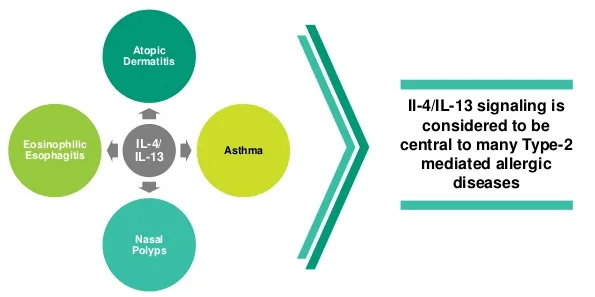
Allergic rhinitis (AR) and chronic rhinosinusitis with nasal polyposis (CRSwNP) are common inflammatory conditions of the upper airways that significantly impact patients’ quality of life. Though both are distinct upper airway conditions, despite their differences, both share a common pathological thread.
Recent advances in treatment strategies have revealed that these conditions, although unique in presentation, respond remarkably well to similar therapeutic approaches.
In recent years, monoclonal antibodies (mAbs) have emerged as a groundbreaking therapeutic option for managing these conditions. This article delves into the pivotal role that monoclonal antibodies play in treating AR and CRSwNP, shedding light on their mechanism of action and clinical effectiveness.
Understanding Allergic Rhinitis (AR) and CRSwNP
Allergic rhinitis is an allergic reaction to airborne allergens, such as pollen, dust mites, and animal dander. It is characterized by symptoms like sneezing, nasal congestion, itching, and rhinorrhea. On the other hand, CRSwNP involves chronic inflammation of the nose and paranasal sinuses, often accompanied by the growth of nasal polyps. Patients with CRSwNP often experience symptoms like nasal obstruction, loss of smell, and facial pain or pressure.
Common Pathological Features
While AR and CRSwNP have distinct etiologies, they share a common underlying pathological mechanism rooted in Type 2 inflammation. Both conditions involve an exaggerated immune response characterized by the activation of eosinophils, basophils, and mast cells, along with the release of inflammatory cytokines such as IL-4, IL-5, and IL-13.
This shared inflammatory pathway results in symptoms like nasal congestion, rhinorrhea, and impaired olfaction, observed in both AR and CRSwNP patients. Furthermore, the presence of elevated IgE levels is a hallmark of allergic reactions in AR, while CRSwNP patients often exhibit increased levels of inflammatory markers like eosinophilic cationic protein (ECP).
The convergence of pathological features between AR and CRSwNP has paved the way for unified treatment strategies that effectively target the common inflammatory pathways.
Monoclonal Antibodies: A Revolutionary Treatment Approach
Monoclonal antibodies are laboratory-engineered proteins designed to target specific molecules in the body’s immune system. In the case of AR and CRSwNP, these monoclonal antibodies are developed to intercept key inflammatory pathways responsible for the persistent symptoms.
Omalizumab: Targeting IgE in AR
Omalizumab, a monoclonal antibody, revolutionized the treatment of AR by targeting immunoglobulin E (IgE), a crucial player in allergic reactions. By binding to IgE, Omalizumab prevents it from attaching to allergens and initiating the allergic cascade. Clinical studies have shown significant improvements in AR symptoms, including reduced nasal congestion, itching, and rhinorrhea.
Dupilumab: A Game-Changer in CRSwNP
Dupilumab, another monoclonal antibody, has garnered attention for its remarkable effectiveness in managing CRSwNP. It targets the IL-4 receptor, a key player in the Type 2 inflammatory pathway implicated in CRSwNP. By inhibiting IL-4 signaling, Dupilumab reduces inflammation and prevents the formation of nasal polyps. Studies have demonstrated substantial improvements in nasal symptoms, sense of smell, and overall quality of life in patients treated with Dupilumab.
Recently in June 2019, the U.S. Food and Drug Administration (FDA) approved Dupixent (dupilumab) as an option of treatment in adult patients with chronic rhinosinusitis who can’t manage their symptoms using intranasal steroids.
Mepolizumab and Reslizumab: Targeting IL-5 in CRSwNP
Both AR and CRSwNP exhibit heightened levels of IL-5, a cytokine that plays a crucial role in the recruitment and activation of eosinophils, a type of white blood cell involved in the inflammatory response. Mepolizumab and Reslizumab are monoclonal antibodies designed to block the action of IL-5, effectively reducing eosinophilic inflammation in CRSwNP. Clinical trials have shown promising results in terms of symptom improvement and decreased reliance on surgical interventions.
Conclusion
The striking pathological overlap between Allergic Rhinitis and CRSwNP provides a compelling rationale for employing unified treatment strategies. Monoclonal antibodies, specifically tailored to target key inflammatory pathways, have emerged as a beacon of hope for patients grappling with these conditions.
By targeting specific components of the immune response, monoclonal antibodies provide targeted and highly effective treatment options for patients suffering from these debilitating conditions.
Although monoclonal antibodies hold great promise for addressing AR and CRSwNP, their high cost presents a substantial barrier. Current treatment approaches, which frequently involve a combination of medications, tend to be more economically viable. As a result, upcoming research should focus on evaluating the cost-effectiveness of biologics, while considering their influence on patients’ quality of life and their role in therapeutic strategies.
